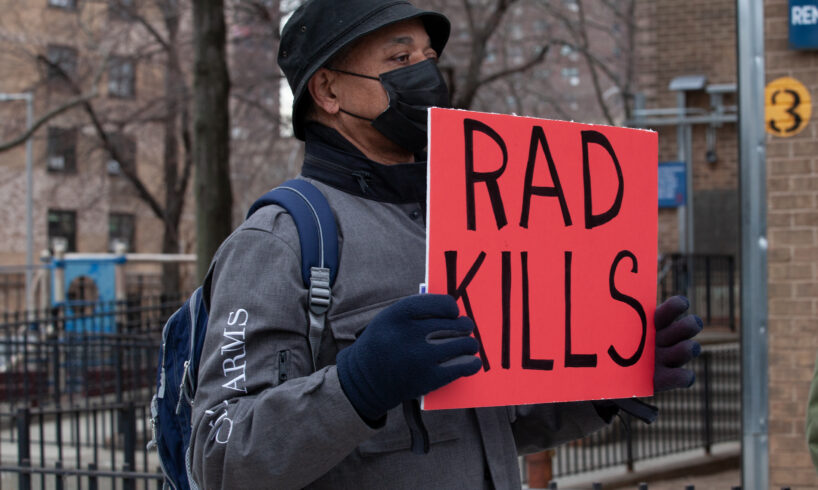
The city Housing Authority’s years-long effort to place public housing into the hands of private managers shows signs of compromising tenants’ rights, a human rights group charged Thursday.
Citing increased eviction rates and a lack of oversight once buildings are turned over, Human Rights Watch released the results of a year-long examination of NYCHA’s plan to place one-third of its 175,000 apartments into the Rental Assistance Demonstration (RAD) program, an Obama-era effort aimed at improving public housing by relying on private sector assistance.
To date, NYCHA has converted 11,000 apartments into its version of RAD, called Permanent Affordability Commitment Together (PACT), with plans to turn over a total of 62,000 units by the time the campaign is complete.
NYCHA retains ownership of the properties but leases the buildings to developers who in turn must fund extensive renovations and maintain developments going forward. The managers then can pocket tenants’ rent and government subsidy funds.
Examining NYCHA’s data for six PACT developments, Human Rights Watch found the eviction rates at four of the properties stayed about the same once they went into the program. But two developments — Ocean Bay Bayside in Far Rockaway, Queens, and Betances in the South Bronx — showed preliminary evidence of eviction numbers that jumped once they went into RAD.
Ocean Bay averaged 10.9 annual evictions in the four and a half years under NYCHA pre-conversion and 16 annual evictions in the three years since, from its 2017 conversion through the statewide eviction moratorium that went into effect in March 2020.
Betances reported 13 evictions in the first 16 months after its conversion in November 2018, compared to 10 evictions in the 2.5 years prior under NYCHA management. That’s a jump in monthly eviction rate from .33 to .72.
The group’s report quoted NYCHA officials stating “most” of Ocean Bay’s evictions under PACT were due to tenants abandoning their homes after refusing to sign leases with the new operators, Wavecrest Management. But Wavecrest reported only six of the 50 evictions there were due to abandonment.
The Human Rights Watch report acknowledged that the eviction data NYCHA provided so far is not adequate “to draw conclusions about whether PACT conversions are generally likely to lead to more evictions.”
But, the report argues, the higher rates at Ocean Bay and Betances “offer a cautionary tale about ways in which the process of conversion could lead to negative impacts on housing rights if inadequate safeguards and oversight aren’t built into the program.”
Left Out
Lack of oversight was a key concern for the group.
As THE CITY reported in 2020, once a development goes into RAD, NYCHA tenants are no longer protected by a federal monitor appointed to oversee NYCHA under a January 2019 agreement with federal housing officials. The monitor acts as a watchdog, making sure NYCHA provides safe, healthy living conditions for all residents.
The Human Rights Watch report noted that tenants in RAD also are no longer subject to a court agreement made last year that bars NYCHA from evicting tenants while they’re contesting their rent calculation or requesting an income adjustment. Public housing tenants pay no more than 30% of their income on rent.
“PACT residents have lost critical protections for their rights and other oversight mechanisms appear inadequate,” the report states. “Perhaps in part due to the reduction in oversight and the program’s financial structure, PACT appears to have created new risks, in certain developments, pertaining to security of tenure.”
And the group highlighted issues that have concerned tenants at developments during the transition to RAD, when private managers and contractors are in the process of renovations and once they take over day-to-day upkeep.
“While PACT has helped improve those conditions for some, other residents of PACT housing still report dealing with mold, failing heat, and unresponsive management,” the report noted. “During construction, residents in several developments have reported facing persistent water shutoffs, elevator outages, and potentially unsafe work practices.”
The report noted tenant complaints at several PACT developments cited by THE CITY, including 344 E. 28th Street, including a contractor who had been hired to do asbestos removal despite repeatedly being cited by city inspectors for violations.
On Wednesday, the Housing Authority’s Chief Communications Officer Barbara Brancaccio responded to THE CITY’s questions about the report, stating:
“Despite NYCHA’s transparency and cooperation with Human Rights Watch over several months, this ‘report’ contains numerous unsubstantiated claims and fabrications about the Authority’s PACT program.
“We agree conditions at NYCHA developments are the consequence of long-term federal disinvestment, and we will continue to use PACT and other innovative strategies to raise capital, make improvements and protect tenant rights and protections. NYCHA is committed to continuously improving PACT by including residents in decisions, and working with PACT partners to prevent displacement, improve engagement and strengthen oversight.”
Human Rights Watch previously documented NYPD abuses during the 2020 racial justice protests.
This article was originally posted on Tenants’ Rights at Risk in NYCHA Conversions, Warns Human Rights Group